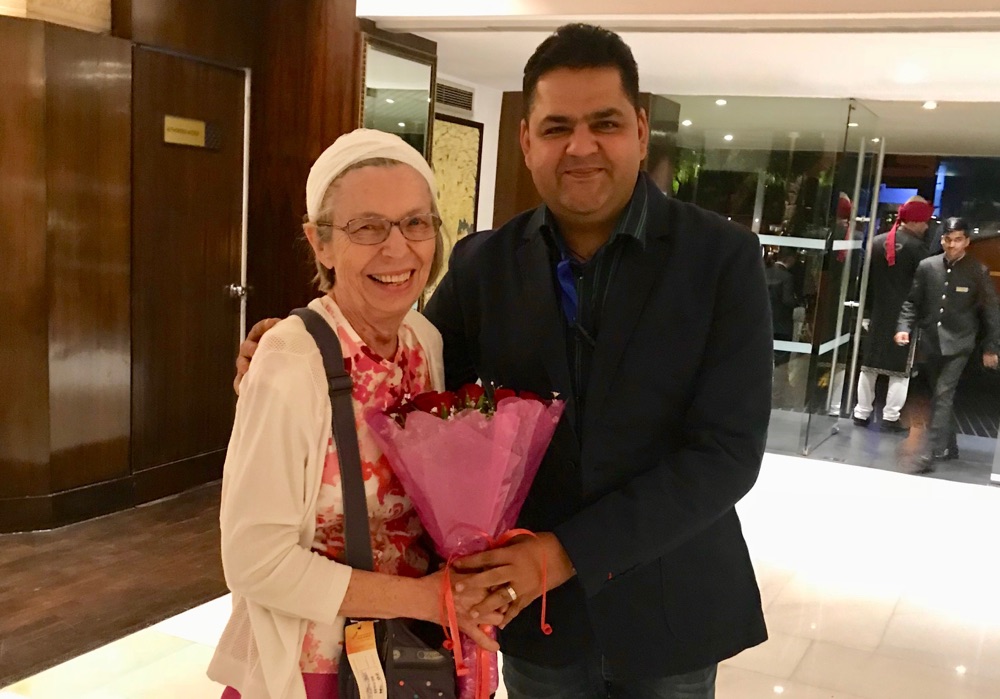Here are a few untold stories from my recent India Tour, stories that for one reason or another just didn’t fit into posts I published each day.
Head injury
The first and most important untold story is about how Bev Morris, one of the women in my tour group, slipped and fell and cracked open her head when she got up in the dark one night in Jaipur and tried to run to the bathroom. She hit her head and opened a cut that required several stitches to repair.

The night manager at the hotel immediately took Bev to hospital where she got excellent treatment. They stopped the bleeding and bandaged her up and gave her a CAT scan, all for 2200 rupees (about $40) which the hotel manager paid.
Bev was up and at ‘em the next morning, bright and cheerful as ever. And she never missed out on any part of our tour program, although she did have to wear a head bandage which was interesting because it looked like a mini-turban and she fit right in and didn’t look out of place at all.
Every few days, she had to pop in to the local hospital in the town or city we were in for the doctor to check on her healing. She made excellent progress and had her stitches removed, for 60 rupees (less than $2) before we returned to Canada.
She tells me that the treatment she received in India was fantastic – professional, courteous. It was also incredibly inexpensive.
We were all impessed by Bev’s amazing attitude as well as her astonishing healing power.

Clean up crew
In Udaipur, I met a fascinating bunch of guys, mostly old guys, who turn up once a week to clean up the local lake. They have their own boat and they go around the lake picking out all the plastic bottles and other garbage people drop in it from the town’s bridge.

They are Udaipur’s environmental Dad’s Army and they impressed me by their enthusiasm for ecological activism.
The lake looked great for their efforts. They told me it was the source of the town’s water, too, and an essential and important resource, not just a pretty body of water to give tourists a picturesque scene to photograph.

Giant latte
At Delhi airport, if you ask for a latte, this is the size of cup you get. I knew I was getting a “large” but who would have thought it would be, hmm, well enormous. This is insanely big. It was impossible to lift this cup without using both hands. Cost: 140-something rupees, about $3.

SpiceJet shocker
SpiceJet is one of the biggest airlines in India. They are fast and mostly efficient and we took a few domestic flights with them. However, our hop from Bengaluru to New Delhi was a pain for some because of the impossibly tight leg room.
SpiceJet likes to pack passengers in when it gets a chance to maximize profits, but this kind of miserably tight space ought to be declared inhuman.

I suspect in the future, historians will feature these seats in a torture museum, saying “Imagine, this is how grim it used to be to travel by air in the 21st century.”
The irony is that SpiceJet knows how terrible this seating is and makes a point of advertising how for a few dollars more you can fly economy in total comfort in what they call “SpiceMax”.
So why not make SpiceMax the standard for economy? Ah, well the airline business today is all about creating ridiculous multiple levels of classes and comfort just to squeeze out a few extra bucks. SpiceJet should set a better example.

Something to whine about.

Wine in India is expensive. This is mainly because no one drinks it, I was told. A bottle of beer, such as the hugely popular Kingfisher, costs about 350 rupees in a hotel lounge (200 if you buy it at the shop) but a glass of ordinary white Sula dry wine is twice as much . . . and that’s for a pathetic four ounce pour. A bottle of Sula costs $70 in most hotels. We managed to find a wine store in Jaipur and picked up a few bottles of Australian Jacob’s Creek for about $22 a bottle but that is still a lot more than we would pay here in Canada. Kingfisher beer, however, was excellent and we soon learned that there are a few different varieties, including Premium, Ultra and Strong.

Love those punky, chunky bananas
In India, we were often served small bananas, some said were grown specially for frying.

But we loved the size and thickness and texture. These short, stubby bananas were like the Goldilocks of fruit – not too big, not too small, just right for a satisfying snack.
Don’t see them anywhere at stores here.

Respect for marigolds

Gardeners in Canada don’t think too much of marigolds. They are the Rodney Dangerfield of summer annuals – they don’t get a lot of respect. I have always loved them. They are what got me into gardening in the first place. They are always so reliable and easy to grow and rewarding. But they are regarded as too common and a little boring here. But in India, not so. There they are esteemed as a treasured and spiritual flower and they are used everywhere as key decoration in temples as well as hotels and restaurants. They are even used to create necklaces. I was happy to see them getting this kind of respect. I will be growing more in my garden this summer.

Begging is big business
We were told repeatedly while in India not to give money to beggars. Our guide explained how a lot of beggar-rings were run by Mafia-type groups that sell licences to give beggars the most lucrative spots in town. We were told there was a famous case of a babysitter who took the baby she was caring for out to use as a prop for begging when the parents had gone to work and then nip back just in time to put the child back into its crib. The India government is trying to stamp out begging and offers all kinds of incentives and benefits to the poor to give them a more dignified alternative to getting what they need. Nevertheless, we did find that hands were always out asking for a few rupees, regardless of where we were, even if a hotel staffer came to your room to fix the TV – a tip of a few rupees was always expected.
Nevertheless, I was deeply touched by the sight of young children walking in heavy traffic as they tried to sell flowers and trinkets.

Bargain basement
It is very commonplace to bargain in the marketplaces in India. The asking price is invariably very high and the final price much, much lower. I was repeatedly asked to pay from 600 to 1,200 rupees for products I eventually bought for a quarter to a fifth of the asking price. This, however, was not the case in regular stores, where the set, labelled price was fixed, unless clearly discounted. You cannot take marketplace bargaining techniques into stores in mall-type complexes, hotels or airport shops.


















